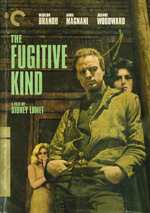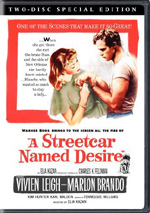|
CRITERION COLLECTION
|

| |
|
MOVIE INFO
|
|
Director:
Sidney Lumet
Cast:
Marlon Brando, Anna Magnani, Joanne Woodward, Victor Jory, Maureen Stapleton, R. G. Armstrong, John Baragrey, Emory Richardson
Writing Credits:
Tennessee Williams (and play, "Orpheus Descending"), Meade Roberts
Tagline:
With a guitar and a snakeskin jacket he drifted out of the rain ... into the lives of these two women ...
Synopsis:
Four Oscar–winning actors - Marlon Brando, Anna Magnani, Joanne Woodward, and Maureen Stapleton - sink their teeth into this enthralling film, which brings together the legendary talents of director Sidney Lumet and writer Tennessee Williams. A smoldering, snakeskin-jacketed Brando is Val Xavier, a drifter trying to go straight. He finds work and solace in a southern small-town variety store run by the married, sexually frustrated Lady Torrance (Magnani), who proves as much a temptation for Val as local wild child Carol Cutrere(Woodward). Lumet captures the intense, fearless performances and Williams’s hot-blooded storytelling and social critique with his customary restraint, resulting in a drama of uncommon sophistication and craft.
MPAA:
Rated NR
| |
|
DVD DETAILS
|
Presentation:
Aspect Ratio: 1.66:1/16X9
Audio:
English Monaural
Subtitles:
English
Closed-captioned
Supplements Subtitles:
None
Runtime: 121 min.
Price: $39.95
Release Date: 4/27/2010
Bonus:
• Interview with Director Sidney Lumet
• “Hollywood’s Tennessee and The Fugitive Kind” Documentary
• “The Plays By Tennessee Williams” TV Presentation
• 20-Page Booklet
| |
|
PURCHASE @ AMAZON.COM
|

| |
|
EQUIPMENT
|
Panasonic 50" TH-50PZ77U 1080p Plasma Monitor; Sony STR-DG1200 7.1 Channel Receiver; Panasonic DMP-BD60K Blu-Ray Player using HDMI outputs; Michael Green Revolution Cinema 6i Speakers (all five); Kenwood 1050SW 150-watt Subwoofer.
| |
|
RELATED REVIEWS
|

| |
[an error occurred while processing this directive]
|
The Fugitive Kind: Criterion Collection (1959)
|
|
Reviewed by Colin Jacobson (April 20, 2010)
Director Sidney Lumet works with multiple Oscar-winning actors in 1960’s The Fugitive Kind. After a run-in with the law, sensitive musician Valentine “Snakeskin” Xavier hightails out of New Orleans. He aspires to leave his wilder ways behind him and change his ways.
On his drive, his car breaks down and he ends up stuck in a small southern town. Sheriff’s wife Vee Talbot (Maureen Stapleton) takes pity on him and help’s Val get a job at a local general store owned by sickly Jabe Torrance (Victor Jory). His Italian wife Lady (Anna Magnani) runs the store and hires Val.
Lady clearly likes Val for reasons other than his work ethic, as do most of the women in town – including wild child Carol Cutrere (Joanne Woodward), a babe from Val’s past. Val deals with the temptations of this small town and his attempts to go straight.
Adapted from Tennessee Williams’ play Orpheus Rising, the studio invested a lot of money into Kind. Brando got a then-stunning payday of $1 million to do it, and the film seemed primed for success.
Despite all the talent behind it, Kind flopped. It failed at the box office and got little critical love. Some will defend it as a lost, misunderstood gem – this DVD’s booklet includes an essay along those lines – but I won’t venture into that territory. While I don’t regard Kind as a poor film, it never coalesces into anything especially satisfying.
I think the film offers a creative mismatch. It takes the typical melodramatic southern environment of Williams and plops this world into the hands of Lumet, a director with a sensibility that seems diametrically opposed to that setting. Lumet’s best work came with films that bordered on a documentary feel, as Lumet seems most effective when he presents a gritty sense of reality.
Which doesn’t fit well with the grandiose characters of Williams. We don’t find anyone quite as extreme as Blanche Dubois, but Kind does veer toward theatrical personalities. Carol becomes the most obvious example of this, as Woodward plays her scandalous nature to the hilt, but virtually all the main characters come across as broad and occasionally over the top.
Val stands as the exception to this rule, though he exemplifies the wordiness that mars Kind. Most of the characters soliloquize and speak in metaphors, and Val acts as almost a caricature in that regard. Who are these people, with their ramblings about legless birds that live in the air?
I know Williams made his name on characters like this, but they don’t work well here. Williams’ roles always teetered on the edge of self-parody, but here they cross that line. Brando gets away with it better because Val remains low-key; his speeches fare better because he underplays them while all the others play to the rafters.
The movie works acceptably well in the scenes between Brando and Magnani. Despite the theatrical nature of the project and their difference in age – Brando was 15 years younger than the not-aging-well Magnani – they exhibit good chemistry. Their scenes occasionally threaten to bring the movie to life.
Unfortunately, it can’t quite rise above its basic flaws and the mismatch between director and author. Lumet attempts to shift in the direction of theatrically but he doesn’t pull this off in a satisfying manner. The Fugitive Kind flirts with success but remains too much of a mess to achieve it.
|
The DVD Grades: Picture B/ Audio C+/ Bonus B
|
|
The Fugitive Kind appears in an aspect ratio of approximately 1.66:1 on this single-sided, double-layered DVD; the image has been enhanced for 16X9 televisions. The transfer didn’t quite excel, but it satisfied.
For the most part, sharpness looked good. A little softness crept into some shots, but the majority appeared reasonably concise and accurate. No issues with jagged edges or shimmering occurred, and I noticed no edge enhancement.
Print flaws were a minor concern. I noticed a few specks, some thin vertical lines, and a little debris at the edge of the screen. These weren’t substantial distractions, though, as the majority of the film looked clean. Blacks were dark and tight, and shadows offered nice delineation. I nearly gave the image a “B+”, but I thought the mold softness and the source issues were enough to knock down my grade to a still positive “B”.
Don’t expect much from the ordinary monaural soundtrack. Speech was intelligible but tended to be somewhat sibilant. Weak looping also was a distraction at times. Music showed decent clarity and minor heft, while effects were mediocre. Those elements came across as a little crunchy and rough but weren’t a problem. Overall, there wasn’t much to like or dislike from this average track.
All of the set’s extras appear on a second disc. A new Interview with Sidney Lumet runs 27 minutes, 47 seconds. The director discusses the source play and its adaptation to the screen, working on other Tennessee Williams works, and many aspects of making Fugitive Kind. Lumet covers these subjects so well that I really wish he’d sat for a full audio commentary; I’d like to hear more about the film and his career. While too brief for me, the interview proves consistently informative and enjoyable.
A documentary called Hollywood’s Tennessee and The Fugitive Kind goes for 27 minutes, 30 seconds. In it, we hear from Robert Bray and R. Barton Palmer, authors of Hollywood’s Tennessee. They get into Williams’ plays, their adaptation to the movies, general aspects of his life and career and specifics about Fugitive Kind. They deliver good insights into the subject matter in this useful program.
Three Plays By Tennessee Williams lasts 55 minutes. This provides a 1958 TV production of three Williams plays directed by Lumet. These include Moony’s Kid Don’t Cry, The Last of My Solid Gold Watches, and This Property Is Condemned. As explained by Williams himself at the program’s start, they come from very early in the playwright’s career, and that rawness shows in these loose, only sporadically engaging plays.
The loud performances don’t help. “Plays” starts at its worst, with extremely broad, hammy turns from Ben Gazarra and Lee Grant in “Cry”. Matters improve a bit in the next two plays, but those actors still produce work that would seem over the top in a big venue; the presence of these performances in the more intimate television setting makes the acting all the more obnoxious. Still, though I didn’t think much of the productions, this is a cool historic extra to find.
As usual, the package finishes with a booklet. In this 20-page text, we find an essay from film critic David Thomson. He offers a look at the play’s genesis, its move to the big screen and aspects of the production. Thomson’s notes help flesh out the flick and add value.
Despite the presence of a well-regarded cast, a legendary author, and a director then on the rise, The Fugitive Kind fails to come together. The main problem stems from the disconnect between the theatrical Tennessee Williams and the realistic Stanley Lumet; the director tries to bend to the author's style but can’t fit that square peg into that round hole. The DVD features good picture, acceptable audio and a nice collection of supplements. Kind might not deserve its fate as a forgotten film, but it doesn’t convince me that it’s an obscure gem, either.
|
|
[an error occurred while processing this directive]
|
|

